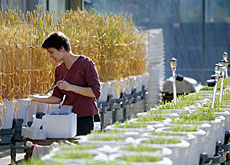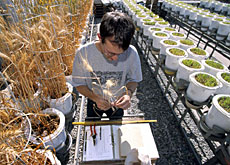Authorities give GM crop trials the green light

The Federal Environment Office has given Swiss scientists the go-ahead to carry out crop trials involving genetically modified (GM) wheat.
It said on Tuesday that two teams could carry out three GM field experiments near Zurich and Lausanne, including observations of potential crossbreeding between wheat and wild grass, but only under “very strict conditions”.
Official appeals against the experiments can still be lodged with the Federal Court within the next 30 days – but only for the Lausanne site, it confirmed.
The scientists from Zurich University’s Institute of Plant Biology and the Institute of Plant Sciences at the city’s Federal Institute of Technology hope the experiments will help answer questions about the release of transgenic plants, specifically in Switzerland.
The trials, which will run over a two-year period from 2008 in Reckenholz near Zurich, and in Pully, on the outskirts of Lausanne, are part of a four-year SFr12-million ($9.8 million) programme funded by the Swiss National Science Foundation.
Genetically modified organisms (GMOs) remain a highly contentious issue in Switzerland. Despite a five-year ban on the use of GMOs in Swiss agriculture, research is still permitted.
The researchers say they will not be developing a product for the market and want to find out if GM wheat plants that have already been tested in laboratories, which show resistance to fungal diseases, behave similarly in normal agricultural conditions.
They also want to look at aspects of biological safety to see if the plants have any unexpected impact on the environment, as well as on organisms living in the ground or insects.
Strict conditions
The Environment Office said it took the decision after receiving approval from the federal health, agriculture and veterinary offices.
“We came to the conclusion that we could approve these tests with the appropriate monitoring and safety conditions,” Bruno Oberle, head of the Environment Office, told swissinfo. “We concluded that there is no danger for human’s health or for the environment.”
However, the researchers will have to work under strict conditions.
“The test monitoring conditions will give higher safety levels,” explained Oberle.
The plants will be located in a covered area, controlled by the police. They will have to be planted at least 300 metres from other species to prevent cross-pollination. Machinery and test materials will have to be cleaned and correctly incinerated.
“A technical commission will monitor the experiments and, according to their position, we can decide at any moment whether or not to stop the experiments,” he added.
Opposition
In November 2005 the Swiss voted in favour of a five-year ban on the use of GMOs in agriculture. During discussions before the vote all political parties said it was necessary and essential to increase research and use the five-year moratorium period to clarify questions.
But the last GM crop trials in Switzerland, which took place in Lindau near Zurich in 2004, resulted in major opposition and a lengthy legal battle.
Official appeals can still be made against the new field experiments, but only in Pully. The Environment Office has decided that the two people opposing the tests in Reckenholz did not live close enough – within 1,000 metres of the test site.
In Pully, 11 people out of a total of 27 who have contested the proposal will be allowed to appeal, according to the Environment Office.
Greenpeace said the decision to allow the tests was “unacceptable”.
The environmental organisation said the appeals did not contain sufficient elements detailing the negative impact of GMOs on other organisms.
It said it would study the Environment Office’s arguments and explore “the best ways of countering this pointless risk”.
The local section of the Communist party said the decision was “irresponsible” taken against the “legitimate concerns of a large number of local inhabitants”. It plans to launch a petition against the experiments.
When the plans were announced in May, the Swiss Working Group for Genetic Engineering said it was very concerned, while the organic farming association Bio Suisse said it was also wary of GM field trials.
swissinfo with agencies
As of April 2007, at least 174 regions, over 4,500 municipalities and other local entities and tens of thousands of farmers and food producers in Europe had declared themselves “GMO-free”.
Across Europe, 70% of consumers have rejected GM foods, according to Friends of the Earth.
Three official GM field experiments have been carried out in Switzerland. In 1991 and 1992 GM potatoes were planted at Changins in canton Vaud and in 2004 research into GM wheat was carried out by the Federal Institute of Technology in Zurich between March 18 and July 14, 2004.
In November 2005 Swiss voters accepted a proposal for a five-year blanket ban on genetically modified organisms (GMOs) in Swiss agriculture.
The result forced the Swiss government to put in place some of the toughest legislation on GMOs in Europe.
The European Union, of which Switzerland is not a member, ended a six-year moratorium on accepting applications for new genetically modified foods in May 2004.
But Germany and France, two of Switzerland’s neighbours, have both voted to uphold national bans on products they deem unsafe.
Spain is the only EU country that has been growing GMOs (GM maize) in any significant quantities. Otherwise, the EU remains largely GMO-free.

In compliance with the JTI standards
More: SWI swissinfo.ch certified by the Journalism Trust Initiative











You can find an overview of ongoing debates with our journalists here . Please join us!
If you want to start a conversation about a topic raised in this article or want to report factual errors, email us at english@swissinfo.ch.